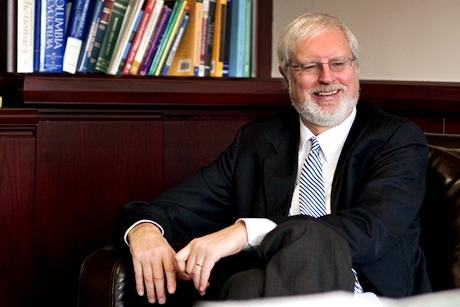Logan Article Central to SCOTUS Dissent
Justice Neil M. Gorsuch relies heavily on an article by Professor David Logan in arguing that the court should have heard a challenge to its landmark 1964 holding in New York Times v. Sullivan.

Professor and former Roger Williams University School of Law Dean David A. Logan enjoyed a “rock-star moment” on the final day of the Supreme Court’s term, completed last Friday as the long Independence Day weekend began.
In an 11-page dissent to the Court’s denial of certiorari in Berisha v. Lawson, Justice Neil M. Gorsuch argued that the court should have heard a challenge to its landmark 1964 holding in New York Times v. Sullivan.His opinion relied heavily on Logan’s recent law review article, Rescuing Our Democracy by Rethinking New York Times Co. v. Sullivan, 81 OHIO ST. L. J. 759 (2020), citing it 16 times.
The upshot, to quote Gorsuch quoting Logan, is that “‘the distribution of disinformation’—which ‘costs almost nothing to generate’—has become a ‘profitable’ business while ‘the economic model that supported reporters, fact-checking, and editorial oversight’ has ‘deeply erod[ed].’” It is therefore time, according to Gorsuch (and Logan) to rethink New York Times v. Sullivan and our current approach to defamation law.
As Logan writes, “with more than half a century of perspective, it is now clear that the Court’s constraints on defamation law have facilitated a miasma of misinformation that harms democracy by making it more difficult for citizens to become informed voters. The time has come to ask a once heretical question: ‘What if New York Times got it wrong?’”
“We all strive to make a difference in our scholarship, teaching, and service—and in our scholarship we seek to critique and improve the law,” said RWU Law Dean Gregory Bowman. “I’m proud to be David’s colleague, and I celebrate his scholarly impact on this centrally important legal issue.”
“Needless to say, I am personally thrilled and professionally honored,” Logan commented. “I don’t recollect ever reading a SCOTUS opinion that so closely tracks a law review article. I have already received congratulatory emails from a couple Torts professors at other schools who are going to cite the opinion and my article in their upcoming books.”
Bowman encouraged members of the RWU Law family and the wider legal community to read Gorsuch’s dissent and Logan's article, as well as a recent Washington Post column discussing the case—and again mentioning Logan.

